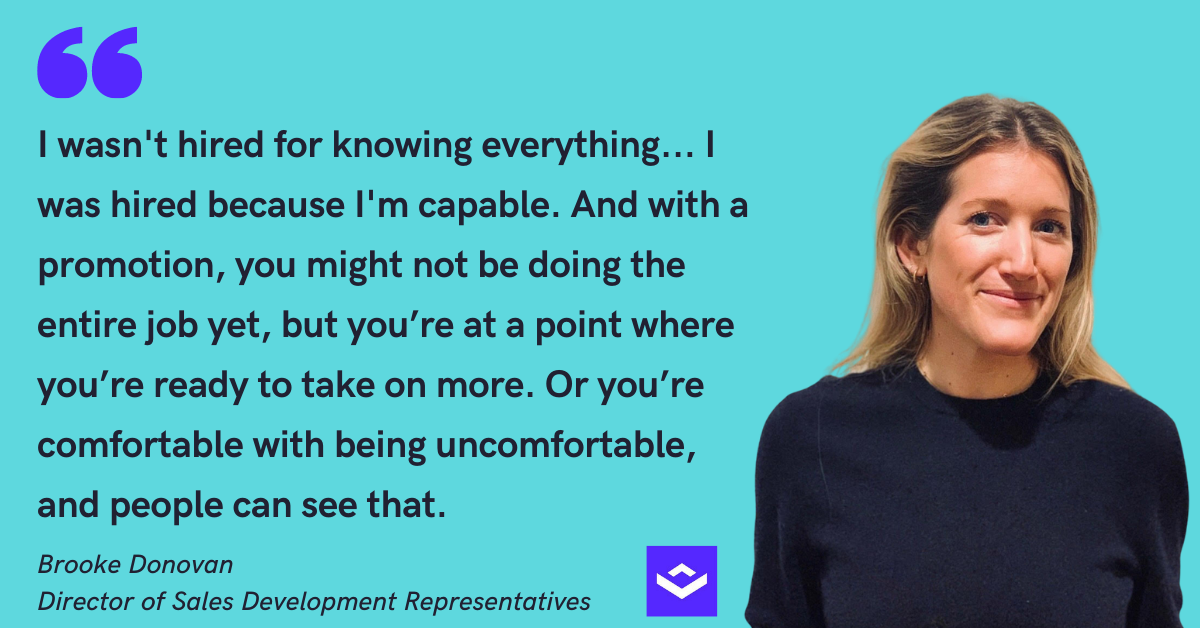Brooke Donovan is learning to snowboard.
A former skier, the Director of Sales Development Representatives at commercial real estate technology company VTS has been spending her weekends traveling from Boston to Maine and Vermont, where she's working on getting down the mountain with minimal damage to herself and others.
"I'd forgotten what it feels like to just throw yourself in it and fail miserably time and time again," says Brooke. "I love that feeling, actually. You're slowly getting better. You absorb what people are telling you to do and the tips and tricks. You pick it up, you feel really good, and you just want to keep getting better and better."
The last time Brooke felt that way was when she took on a major promotion at work and had to learn to manage people for the first time. Both times, Brooke was well-served by her willingness to be a sponge and lean in to what she didn't know. (Though doing so on the slopes has been a bit of a bumpy ride. "I'm covered in bruises, but other than that, it's great!" says Brooke.)
We sat down with Brooke to talk about how she approaches growing her career in sales, what she loves about the roles she's taken on at VTS, and what she would encourage women looking to get into sales—whether at VTS or elsewhere—to consider as they start their career.
Part detective, part project manager
When Brooke describes her job, she uses a framework that her boss, VTS' CRO, shared with her: sales requires you to be part detective, part project manager.
"The detective work is—how can I find out every little bit of information about a person and organization? How do I unveil their pain? The outcomes that they're looking to deliver? How do I really get to the root of what is going on? And then, how can our software hopefully solve some of those problems?" explains Brooke, who says that once a deal is agreed upon, it's all about shepherding it over the finish line in a project management capacity. "I really like doing both of those things."
Sales builds on her strengths, says Brooke: active listening, curiosity, and empathy on the detective side, and organization, thoughtfulness, and accountability on the project management side.
Brooke started as an account manager at Hightower, a company that later merged with VTS. Her first transition was learning to see her former competition as her teammates. "You realize we're all human beings, and we're all after the same goals," she says of that growth period. She was soon asked to teach other account managers, helping them develop both sides of their roles, too.
Then her next challenge required something new.
Imposter syndrome and leaning in
When Brooke was promoted to a manager of sales development reps (SDRs), she experienced her first bout of imposter syndrome. She charts three things as its causes.
First, she was moving into a management role when she hadn't done the job of the people reporting into her. It wasn't just growing her scope—it was working with a completely different team on day-to-day functions she was unfamiliar with.
Second, she was managing people for the first time.
And third, she was inheriting the role from someone who had, in her words, "crushed it," and is VTS' current VP of Sales.
"That imposter syndrome for me really, really kicked in. It was, 'Oh gosh, how am I ever going to be as good as him in this job? I've never done this before. What am I doing?'" shares Brooke. "And what I slowly realized is that I wasn't hired for knowing everything. In fact, that was intentional. I was hired because I'm capable. And with a promotion, you might not be doing the entire job yet, but you're at a point where you're ready to take on more. Or you're comfortable with being uncomfortable, and people can see that."
As she grew into her role, Brooke decided to lean into her strengths and the things that had shown her bosses she was ready for the next step. That included skills she'd honed in her account management roles, as well as her relationships across the firm.
"Maybe I wasn't incredible at coaching someone on how to do the perfect cold call, but I knew how to teach them to prepare for that call so they'd sound credible, so they'd know what they're talking about, so they could connect dots that would ultimately make that conversation easier," she says.
Brooke also connected her SDRs with other parts of VTS' business, from sales to product to engineering to marketing, so that they could get exposure to how the company works and get a sense of where they'd like to take their own careers.
Then Brooke was ready to level up again, from manager to director, and this time, she was ready for it.
She'd worked with the executive coach that VTS makes available to leaders within the company. "She is absolutely phenomenal," says Brooke. "I had multiple sessions with her thinking through how to advocate for myself." She presented a case to her managers about the promotion, laying out what she wanted to accomplish before becoming a director, and they signed off.
"It was super gratifying," she says. "I didn't have to fight for it. There was no gray. It was very, very black and white."
Now, in her current role as a director, she's focused on the next evolution of VTS' SDRs, supporting the ones on the ground and looking to hire more.
Succeeding as an SDR at VTS
Brooke expects the sales development reps that work for her to really support the success of the company. To make that possible, says Brooke, VTS has invested in a comprehensive program for people in that role. It's a career ladder that goes from onboarding, attending the VTS sales academy to learn key skills, shadowing calls, taking their own calls, and eventually being promoted into more roles within the sales team, or roles on other teams—like implementation, client advisory, and account development—driven by their interests.
That infrastructure has let her employees succeed, and Brooke enjoys celebrating those wins. She's seen her SDRs do everything from closing their first $100,000 deals to winning a department-side sales presentation competition. (The woman who did that was actually interviewing for a promotion the day that we interviewed Brooke!)
Brooke has some advice for people who want to be successful SDRs at VTS, both before and after they're hired.
In the interview stage, she has one key tip:
- Be comfortable with vulnerability. "I've seen a ton of candidates who show up just acting like they know all the answers. And I get it," she says. "But showing up very buttoned up, I can't really see what your personality is. I'm not really sure why you actually want to be in sales. I don't get a sense of what you've been through and what has brought you here. When people aren't afraid to get a little vulnerable with me, that just shows that they're human and that's the kind of thing I'm looking for."
And for new hires, she has two more:
- Be consistent. New hires will sometimes call Brooke, she says, and tell her that no one's been picking up the phones. "I'll ask, 'How many days have you been calling?' and they'll say, 'Well, four.' I'm like, 'Okay, talk to me when you've been calling for six months.' It's longevity, it's staying to your process, it's staying consistent, and it's knowing that the things that you're doing are right, but that you might not see success on the first try."
- Ask for feedback early and often. Brooke says that she always talks about this when she's doing interviews. "You know, we play everyone's calls. We dissect as a group, we give feedback to each other. You can't be embarrassed or think that you did a bad call because I guarantee you that your call is going to help someone else learn. And someone else's call is going to help you learn."
Pushing herself to be better
As Brooke continues to grow her career, she knows that there will be other challenges she'll have to face. The thing that drives her to keep learning and developing her skillset is her belief in the caliber of her team.
"For me, I want to do better because of the people that I hire," she says. "If you start to just continue to hire better and better talent, you have to get better and better and better, because there's that expectation of what they're going to learn, what they're going to absorb, how quickly they're going to grow. And that means I need to keep elevating my game."




